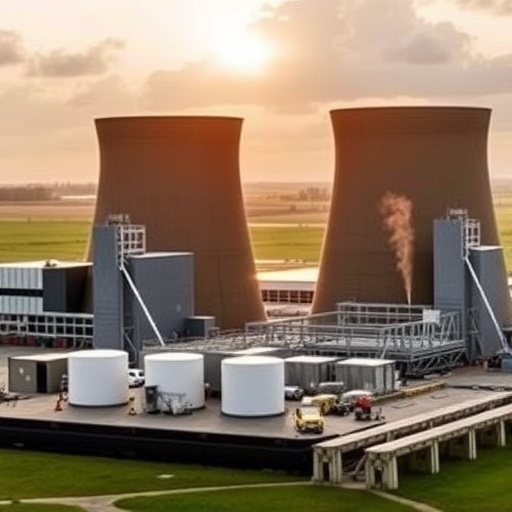A pioneering collaboration among several leading UK universities has secured a significant research grant to revolutionize the lifecycle management of graphite within nuclear energy systems. This bold initiative acknowledges the critical role graphite plays as a foundational material in advanced nuclear reactors and aims to elevate the UK’s capabilities in this domain, promoting sustainability, security, and innovation in nuclear power deployment.
Spearheaded by The University of Manchester, this consortium also comprises academic powerhouses from the Universities of Oxford, Plymouth, and Loughborough. Their collective expertise is poised to address pivotal challenges facing the UK’s nuclear industry as it aspires toward net zero carbon emissions and energy sovereignty through advanced nuclear technologies.
Nuclear energy continues to be heralded as a cornerstone for achieving the UK’s stringent climate targets, given its near-zero greenhouse gas emissions footprint. Yet, despite its promise, nuclear technology is intertwined with complex material and supply chain challenges, particularly concerning the availability and sustainability of reactor-grade graphite. Graphite, an allotrope of carbon, is indispensable for the structural and functional integrity of many Advanced Modular Reactors (AMRs), including High Temperature Gas-cooled Reactors (HTGRs) and emerging Molten Salt Reactor (MSR) designs, both of which are integral to the UK’s ambition to deploy a staggering 24 gigawatts of new nuclear capacity by 2050.
The five-year ENLIGHT programme—Enabling a Lifecycle Approach to Graphite for Advanced Modular Reactors—has been awarded an £8.2 million grant from the UK’s Engineering and Physical Sciences Research Council (EPSRC), supplemented by around £5 million in contributions from industry stakeholders. This funding underlines the strategic importance of developing indigenous, sustainable pathways for the production, reuse, and recycling of nuclear-grade graphite to mitigate the UK’s current dependence on foreign imports.
Professor Abbie Jones, who leads the project as Chair in Nuclear Graphite at The University of Manchester, emphasizes that the UK presently lacks a domestic supply chain for this critical material. The programme’s multifaceted approach seeks not only to re-establish a sovereign graphite supply but also to innovate novel methods for the decontamination and repurposing of irradiated graphite waste. With decommissioning of the existing Advanced Gas-cooled Reactor (AGR) fleet anticipated by 2028, there is an urgent need to manage over 100,000 tonnes of graphite irradiated during reactor operation—a substantial and potentially hazardous nuclear waste stream.
ENLIGHT’s strategic innovation focuses on transforming this legacy waste into a recyclable resource through advanced decontamination techniques, thereby reducing environmental impact and financial burdens associated with long-term waste sequestration. Concurrently, the programme addresses the complex material science challenges of designing new graphite composites engineered to endure the extreme radiation flux, high temperatures, and corrosive environments encountered within AMRs, ensuring enhanced durability and reactor safety.
Oxford’s Professor James Marrow will spearhead the theme centered on graphite selection and design. His work involves sophisticated mechanical damage studies to better understand the material response under operational stressors and irradiation, informing the development and certification of next-generation nuclear graphites. This foundational research underpins the safety and economic viability of future reactors by extending component lifespans and mitigating degradation risks.
Complementing experimental efforts, researchers at Loughborough University are harnessing cutting-edge computational modelling to simulate graphite behavior under reactor-relevant conditions. Dr Kenny Jolley, a Senior Lecturer in Materials Modelling, highlights that these simulations can forecast failure mechanisms, providing vital insights for the predictive maintenance and design optimization of reactor components. Computational insights are essential for accelerating materials development cycles and minimizing costly empirical testing.
Meanwhile, the University of Plymouth contributes its deep expertise in porous materials characterization—critical for assessing the microstructure and performance of both legacy and newly designed graphite. Dr Katie Jones underscores that understanding porosity and related physical properties is pivotal to ensuring that recycled graphite can meet stringent safety and performance criteria required by AMRs. This expertise also facilitates improved quality control and process optimization throughout graphite manufacturing and refurbishment.
The ENLIGHT programme extends beyond material innovation, emphasizing the development of a skilled workforce equipped with specialized knowledge in nuclear graphite science and engineering. Expanding the UK’s talent pool in this niche yet vital field is seen as essential for sustaining leadership in nuclear innovation and ensuring the safe, effective deployment of next-generation reactors.
The anticipated benefits of this comprehensive lifecycle approach are multifaceted. By establishing sustainable supply chains and pioneering recycling methodologies, the programme could potentially yield savings upwards of £2 billion in future waste management expenses. More broadly, it positions the UK at the forefront of nuclear materials research, consolidating its status as a global hub for graphite innovation amidst accelerating clean energy transitions.
From an environmental regulatory perspective, the partnership includes stakeholders such as the Environment Agency, which aligns closely with the programme’s goals. This collaboration ensures that regulatory frameworks evolve in tandem with technological advancements, fostering a synergistic pathway that balances innovation with safety and environmental stewardship.
Altogether, ENLIGHT exemplifies an integrated strategy to nuclear fuel cycle management, marrying advanced material science, sustainable engineering practices, and pragmatic policy engagement. Its outcomes promise to unlock new frontiers in reactor technology, underpinning the UK’s ambitious clean energy future while addressing the pressing imperatives of waste reduction, carbon neutrality, and national energy security.
Subject of Research: Nuclear graphite lifecycle management, advanced modular reactor materials, sustainable graphite recycling and design.
Article Title: (Not provided)
News Publication Date: (Not provided)
Web References: (Not provided)
References: (Not provided)
Image Credits: (Not provided)
Keywords: Nuclear energy, Advanced Modular Reactors, Graphite lifecycle, Sustainable materials, Nuclear waste recycling, Energy resources, Engineering, Green energy, Nuclear engineering, Reactor safety, Atmospheric chemistry, Environmental sciences




